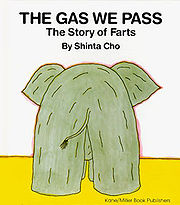
The Gas We Pass
Encyclopedia

Children's literature
Children's literature is for readers and listeners up to about age twelve; it is often defined in four different ways: books written by children, books written for children, books chosen by children, or books chosen for children. It is often illustrated. The term is used in senses which sometimes...
written by Shinta Cho. The book tells children about flatulence
Flatulence
Flatulence is the expulsion through the rectum of a mixture of gases that are byproducts of the digestion process of mammals and other animals. The medical term for the mixture of gases is flatus, informally known as a fart, or simply gas...
(also known as farting
Fart
Fart is an English language vulgarism most commonly used in reference to flatulence. The word "fart" is generally considered unsuitable in a formal environment by modern English speakers, and it may be considered vulgar or offensive in some situations. Fart can be used as a noun or a verb...
), and that it is completely natural to do so.
The book also discusses other animals and their habits of flatulence. The book continues on to tell its readers about why farts smell bad, and what animals only seem to fart (skunk
Skunk
Skunks are mammals best known for their ability to secrete a liquid with a strong, foul odor. General appearance varies from species to species, from black-and-white to brown or cream colored. Skunks belong to the family Mephitidae and to the order Carnivora...
s and stink bugs).
The book is part of the My Body Science series of books.
The book was first published in Japan
Japan
Japan is an island nation in East Asia. Located in the Pacific Ocean, it lies to the east of the Sea of Japan, China, North Korea, South Korea and Russia, stretching from the Sea of Okhotsk in the north to the East China Sea and Taiwan in the south...
by Fukuinkan Shoten, and since has been translated into numerous languages, such as English
English language
English is a West Germanic language that arose in the Anglo-Saxon kingdoms of England and spread into what was to become south-east Scotland under the influence of the Anglian medieval kingdom of Northumbria...
, French
French language
French is a Romance language spoken as a first language in France, the Romandy region in Switzerland, Wallonia and Brussels in Belgium, Monaco, the regions of Quebec and Acadia in Canada, and by various communities elsewhere. Second-language speakers of French are distributed throughout many parts...
, Portuguese
Portuguese language
Portuguese is a Romance language that arose in the medieval Kingdom of Galicia, nowadays Galicia and Northern Portugal. The southern part of the Kingdom of Galicia became independent as the County of Portugal in 1095...
, and Spanish
Spanish language
Spanish , also known as Castilian , is a Romance language in the Ibero-Romance group that evolved from several languages and dialects in central-northern Iberia around the 9th century and gradually spread with the expansion of the Kingdom of Castile into central and southern Iberia during the...
. In the United States, it was published by Kane/Miller Book Publishers in 1994.
The New York Times reported in 1997 that The Gas We Pass had 380,000 copies in print and had made appearances on Publishers Weekly
Publishers Weekly
Publishers Weekly, aka PW, is an American weekly trade news magazine targeted at publishers, librarians, booksellers and literary agents...
's children's books best-seller list. According to the Times, the publishers estimated that half the sales of The Gas We Pass and Everyone Poops were to adults for other adults. Publishers Weekly listed The Gas We Pass and other titles in the My Body Science series in a survey of children's books which continue to sell well year after year, noting that the series as a whole had sold over 2 million copies by 2003. In 2007, when Kane/Miller first had an exhibit at Toy Fair, Publishers Weekly noted that the publisher "displayed its spring titles as well as its bestsellers Everyone Poops and The Gas We Pass."

